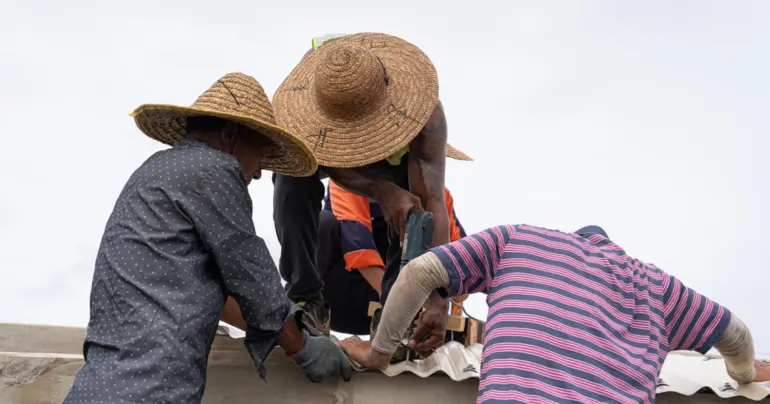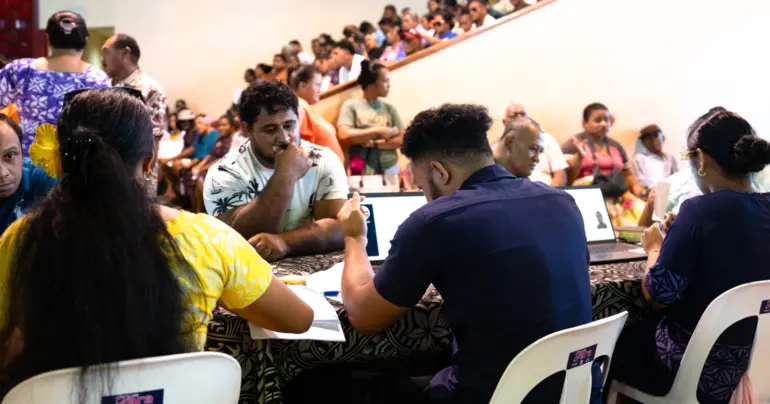We should all hope for a leakier Parliament
 By The Editorial Board
•
27 January 2021, 11:10PM
By The Editorial Board
•
27 January 2021, 11:10PM
Though we are not in his good books at present, we can sympathise with the Clerk of the Legislative Assembly, Tiatia Graeme Tualaulelei.
Tiatia’s job is very significant to the functioning of our democracy. Being vested with complete control over the grounds of the Parliamentary complex that houses Samoa’s political debate, as he is, he is also used to being in control of his domain.
So for a story to leak from within the Clerk’s office and be splashed on the front page of this newspaper must have been a dismaying experience. For the leak to themselves be about leaks emanating from inside the very building he oversees, well, we can only imagine it added insult to injury.
But with all due respect to our peer and occasional but always esteemed adversary on the cusp of Samoa’s democracy, we must disagree with some of his recent criticism of this newspaper.
At issue for Tiatia, is a front-page story on the most recent edition of the Sunday Samoan about the Parliament of Samoa having suddenly sprung leaks in its roof (“Brand new Parliament Building springs leak”.)
The news was particularly unexpected after the new Maota Fono was opened fewer than two years ago.
It was done so amid an outpouring of congratulation for a job well done by the project’s funders, Australia and Samoa, and the Samoan tradesmen who helped construction.
“We do not condone the unethical behaviour of disclosing confidential official matters which concerns only the Project Steering Committee and its Contractors,” Tiatia said in a statement released on Tuesday.
“Only an individual with an appreciation of modern architecture and engineering structures can recognize the high level of project management, contract administration, design thought process and construction that went into building this project.”
We have previously engaged in a back-and-forth with Parliamentary authorities, including Tiatia himself, about when it is and is not appropriate to release Parliamentary information.
Most recently we took issue with the extreme length of time it took to release the final copies of legislation making alterations to the nature of democracy and law in Samoa of a magnitude not matched since the introduction of universal suffrage.
That this legislation, nine months in the making through a show of endless public consultation, could be suddenly and radically altered on the floor of Parliament on the morning of its passage is, to us, objectionable.
So is the fact that a copy of these changes was not released to the public until the issue had died down three weeks later.
But we evidently come at things from a different philosophical viewpoint to Tiatia, who decried our reporting on confidential matters “unethical”.
We must ask: who deems the fact that a roof has sprung a leak a state secret and on what grounds? There is an official answer, we’re sure, but does any of it make a lick of moral sense?
There were numerous reasons why we chose to report on the defects in the Parliament building.
Firstly, the Samoan people deserve to know the truth about difficulties occurring in public projects in their country; the opening of a new house of democracy in a blaze of publicity could not, in our opinion, fall more squarely in the public’s interest.
Which is another reason why the story was plainly in the public interest. It was never merely a story about a leaky roof. It was a story about a poorly managed Government contract.
Let us quote to you from the original letter from Tiatia’s Office:
“[It needs to be determined why the company] rejected the [Government of Samoa’s] condition to provide a bank guarantee for the partial retention release,” the letter reads.
Indeed, the issue of how a project of such significance was allowed to proceed without an easily liquidated bank guarantee that would have covered repairs is a major question that should be answered.
Any issue that relates to the spending of public or donor money and Government contracting in general is a matter that is obviously in the public’s interest to be revealed.
This poor process left a bad taste, not just in the mouth of the Clerk of the Legislative Assembly’s Office but in all businesses involved. Indeed, this was so much the case that concerns were raised about the ability for labour to be found for a second project.
We return once again to the original letter from Tiatia’s office:
“The missing bank guarantee of $1.5 million led to “frustrated” subcontractors who had been contacting the Ministry of Finance, the Clerk’s Office and even the Australian Government seeking payment, the letter says.
“The [construction company] have advised they will not tender for Government projects again.”
Well, there you have it. One Government department alleging a standard requirement in the construction industry was never enforced, by whom we do not know but would like to.
But the result was for Samoan business to go unpaid.
Again, if the failings of Government project management affect the welfare of Samoan businesses and the livelihoods of their employees and owners we consider that very much a matter in the public’s interest.
It’s called scrutiny. We expect Tiatia knows this rhetoric backward, but we’ll risk repeating ourselves: by keeping each branch of the Government (of which we are an unofficial fourth) in healthy tension with the other the result is accountability.
The Clerk might remember testifying in a recent court case about a decision to eject two Members of Parliament, one which the Supreme Court threw out as unconstitutional. It’s kind of like that.
Let us return to the Clerk’s claim that only an individual with knowledge of everything from architecture to project management to engineering could comprehend a project of this complexity.
We were not designing new load-bearing beams. We were reporting on a letter and made clear from the outset that setting aside money for post-construction faults is a common occurrence but had not, for reasons unknown, been adhered to in this case.
That and the many people who were affected by it was the real meat of our story.
But we return to the original letter from Tiatia’s office one final time to illustrate what we feel might succinctly display the philosophical difference between he and us:
“[Adverse] reactions would jeopardize the project and put both Governments of Australia and Samoa in bad (sic) media,” the letter wrote.
We believe our readers are denied far too much knowledge already about the process of the Governments which they elect.
Criticism about the leaky roof affair reflects an attitude too common among our current class of Government officials that they are entitled to control public information so that it exclusively portrays them positively.
The alternative is to keep the public in the dark and presenting public life to them as a cheerful procession of ribbon cuttings, building openings and handshakes.
But we believe our readers are intelligent enough to know that the truth always has its shabby aspects; and only by letting them in on them can we expect things in Samoa to improve.
We think the Government should start paying them the same courtesy.
 By The Editorial Board
•
27 January 2021, 11:10PM
By The Editorial Board
•
27 January 2021, 11:10PM










